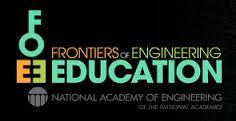
Chloe Arson (School of Civil and Environmental Engineering) and Julie Linsey and Cassandra Telenko (Woodruff School of Mechanical Engineering) recently participated in the National Academy of Engineering’s Seventh Frontiers of Engineering Education (FOEE) Symposium to share innovative educational ideas with an enthusiastic group of like‐minded engineering educators. The symposium recognizes accomplishment, facilitates learning, broadens collaboration, and promotes dissemination of best practices in engineering education. Held in Irvine, CA, FOEE brought together 70 engineering faculty members who are developing and implementing innovative educational approaches in a variety of engineering disciplines for two and a half days of discussion, reflection, and collaboration. Invited attendees participated in panel presentations, small group discussions and report‐ backs, and networking activities.
FOEE aims to strengthen the engineering and innovation capacity and capability of the nation by catalyzing a vibrant community of emerging engineering education leaders. Faculty members are first nominated by NAE members or deans and then complete an application describing their educational innovation. The structure of FOEE allows for a great deal of interaction between the invited attendees, speakers, and committee members, including both formal networking in small affinity‐ group discussions and informal networking at receptions and meals. In contrast to traditional educational or research meetings, FOEE focuses on peer‐to‐peer knowledge sharing and mentoring as well as community‐building and collaboration.
Past FOEE invited attendees from the College of Engineering are Alexander Alexeev and Bara Cola (Woodruff School of Mechanical Engineering), Elliot Moore II (School of Electrical and Computer Engineering), Kamran Paynabar (Industrial and Systems Engineering) and Manu Platt (Wallace H. Coulter Department of Biomedical Engineering) in 2014; Adjo Amekudzi (School of Civil and Environmental Engineering), Joseph Le Doux (Wallace H. Coulter Department of Biomedical Engineering), Amy Pritchett (Daniel Guggenheim School of Aerospace Engineering) and Maryam Saeedifard (School of Electrical and Computer Engineering) in 2012; Joel Sokol (H. Milton Stewart School of Industrial and Systems Engineering) in 2011; Victor Breedveld (School of Chemical and Biomolecular Engineering) and Johnna Temenoff (Wallace H. Coulter Department of Biomedical Engineering) in 2010; and Dirk Schaefer (Woodruff School of Mechanical Engineering) in 2009.
Invited attendees strengthen their professional capacity for engineering education innovation by:
- identifying and understanding how to apply identified best practices in engineering education;
- developing new ideas to advance their innovations in engineering education;
- developing an understanding that engineering educational innovation should be guided by the evolving evidence‐based body of knowledge on engineering learning, in part established through research in engineering education;
- establishing long‐lasting professional relationships with those attending the symposia, and through those relationships establish new or broadened networks with other educational innovators; and
- becoming agents of change to help advance the U.S. capacity for engineering education innovation.